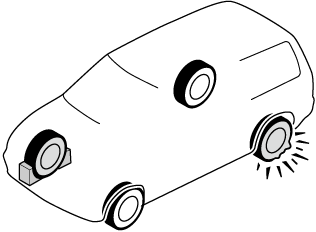Changing a Flat Tyre
If the following occurs while driving, it could indicate a flat tyre.
-
Steering becomes difficult.
-
The vehicle begins to vibrate excessively.
-
The vehicle pulls in one direction.


If you have a flat tyre, drive slowly to a level spot that is well off the road and out of the way of traffic to change the tyre.
Stopping in traffic or on the shoulder of a busy road is dangerous.
Be sure to follow the directions for changing a tyre:
Changing a tyre is dangerous if not done properly. The vehicle can slip off the jack and seriously injure someone.
No person should place any portion of their body under a vehicle that is supported by a jack.
Never allow anyone inside a vehicle supported by a jack:
Allowing someone to remain in a vehicle supported by a jack is dangerous. The occupant could cause the vehicle to fall resulting in serious injury.


Make sure the jack is well lubricated before using it.


-
Park on a level surface off the right-of-way and firmly set the parking brake.
-
Put a vehicle with an automatic transaxle in Park (P), a manual transaxle in Reverse (R) or 1, and turn off the engine.
-
Turn on the hazard warning flasher.
-
Have everyone get out of the vehicle and away from the vehicle and traffic.
-
Remove the jack, tool, and spare tyre (Search).
-
Block the wheel diagonally opposite the flat tyre. When blocking a wheel, place a tyre block both in front and behind the tyre.

When blocking a tyre, use rocks or wood blocks of sufficient size if possible to hold the tyre in place.
Close Note View Note
View Note


 Read this first
Read this first










